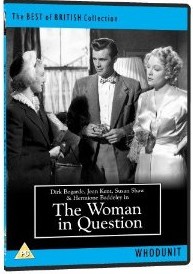- This essay will inevitably contain spoilers!
'THE WOMAN IN QUESTION' (1950)

- A review by Richard Harrison (2010)
Anthony Asquith is one of the unsung greats of British cinema, a
director whose career began
as far back as 1927 and encompassed many notable films (A Cottage on
Dartmoor, Pygmalion
, Cottage To Let and We Dive At Dawn were all made
before the end of the Second World
War) as well as forays into the work of Wilde and Rattigan. Asquith's
last
films were made in the 1960s, when
the sun was setting on British cinema, and, as it turned out, on his
life and career as well. Even though he was born in Edwardian London,
there is something of the Victorian about Asquith- and the
latest Odeon Entertainment release, The Woman In Question, does
nothing to dispel this.
The American title for the film- Five Angles on Murder is
perhaps a more appropriate one, and one
that might have led to The Woman in Question doing better
business at the box-office at the end of
1950. In short, a murder is committed, and we see the recollections of
events from at least five different (and
overlapping) perspectives. This intriguing structure is deftly created
with a mixture of flashbacks interspersed with the police investigation
which acts as a motivator for the memories. Although my earlier
Victorian comment
is borne out in the taut drama that unfolds, the material is at times
handled with
a light wit, particularly early on. This humour largely revolves around
the character
of Mrs. Finch (brilliantly portrayed by Hermione Baddeley), who soon
gives way to more
intensely dark characterisations.
The darker mood that predominates as the film goes on is created partly
by its performances
from a strong cast who instil just the right degree of tension and
angst to the situations.
Jean Kent (in a tour de force) is supported by Charles Victor
(who had previously worked with
Asquith on The Way To The Stars in 1945) and a young Dirk
Bogarde, who had caught the public eye
with a strikingly serious performance in The Blue Lamp,
released earlier in 1950. Indeed, Bogarde's
versatility is seen in evidence here as his character Bob Baker is more
of an enigma than some of the others-
a mist of secrecy surrounds much of the character's background, even
down to the pretence of his Transatlantic
accent.
One of the most annoying things about British film is that there is an
oft-cited nominal list of "cult" or "great films" (ranging from
Brighton Rock to Get Carter) which often seems to preclude
other 'new entries' from
being considered even in the same breath. The Woman in Question,
though,
is
an
excellent film- and one that
should sit quite happily with the best of postwar British cinema. One
of the film's central issues- that a person
can be viewed quite differently by several of their friends or
acquaintances- is a highly intelligent one, and
therefore offers food for thought beyond the running time of the film's
narrative. It is to be hoped that the excellent
work Odeon Entertainment is doing raises the profile of solid British
talent, from actors to
directors like Anthony Asquith, who deserve wider acclaim and
recognition.
The Woman in Question is available on DVD
from Odeon Entertainment.
Back
Home

